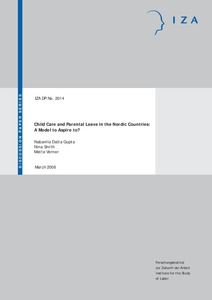Child care and parental leave in the Nordic countries: a model to aspire to?

Datta Gupta, Nabanita ; Smith, Nina ; Verner, Mette
Institute of Labor Economics, Bonn
IZA - Bonn
2006
56 p.
child care ; family policy ; gender ; parental leave ; statistics
Discussion Paper Series
2014
Social protection - Family responsibilities
English
Bibliogr.
"The Nordic countries have remarkably high participation rates of mothers and a moderate decrease of fertility rates compared to other western countries. This has been attributed to the fact that the welfare state model and, especially, the family friendly policies chosen in the Nordic countries are unique. The availability of generous parental leave schemes including high compensation rates makes it possible for mothers to take a considerable time out of work in connection with childbirths and to return to their previous jobs afterwards, thanks to the high provision of public daycare. In this paper we evaluate family-friendly policies in the 'Nordic model' with respect to the two modes of child care i.e. either parental care facilitated by maternal and parental leave schemes or non-parental publicly provided care. Our questions for discussion are: Is there a 'Nordic model', and is it worth the cost if effects on child development and welfare are included? Is there a trade-off between family-friendly policies and family welfare, and are there serious negative boomerang effects of family-friendly policies on women's position in the labor market? Is the 'Nordic model' a model to aspire to? "
Digital
The ETUI is co-funded by the European Union. Views and opinions expressed are however those of the author(s) only and do not necessarily reflect those of the European Union or the ETUI.